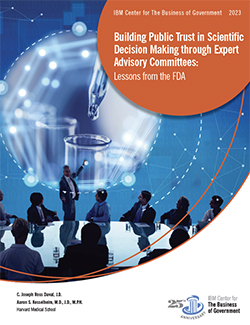
How Can Health and Science Agencies Strengthen Engagement with Expert Advisory Committees?

Co-Author: Katie Webb, Lead Account Partner, Department of Health & Human Services, IBM
Advisory committees provide critical scientific insights and credibility for agencies across the government. In a new report for the IBM Center, Building Trust in Scientific Decisionmaking Through Expert Advisory Committees: Lessons from the FDA, authors Joseph Daval and Aaron Kesselheim with the Harvard Medical School evaluate the use of advisory committees by expert scientific regulatory agencies. The authors use the Food and Drug Administration (FDA) as a case study by examining data and impact of such committees on agency decision making. When faced with difficult decisions about new drugs or medical devices, the Food and Drug Administration (FDA) is authorized to consult with advisory committees of independent experts. Advisory committees provide critical scientific insights and credibility for FDA efficacy and safety determinations.
Leveraging data on the frequency, outcomes, and deliberative process of FDA advisory committees, this new report describes the impact of expert advisory committees on FDA decision making. The research discussed the roles that expert advisors play in this essential public health agency, and the report makes evidence-based recommendations that policymakers can implement to make advisory committees optimally useful for the FDA, with relevance for scientific decision-making across the government. Key recommendations include:
- Establish Consistency in Advisory Committee Referrals
- Restructure Meetings to Expand Time for Committee Discussion
- Bolster Voting Procedures to Ensure the Integrity of Recommendations
We hope that this report provides a framework for how science-based agencies can best engage with expert independent advisory committees.



